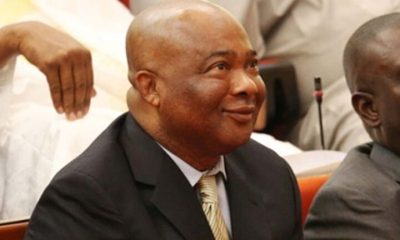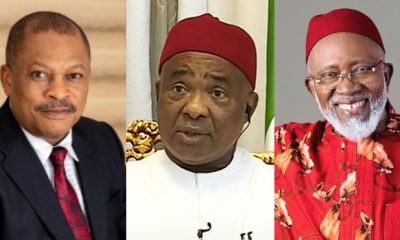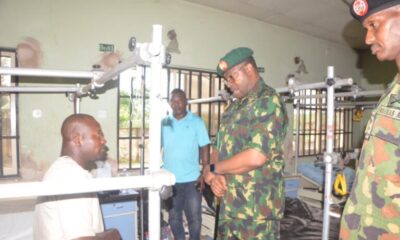News
Uzodinma tasks NIS on strict migration guidelines
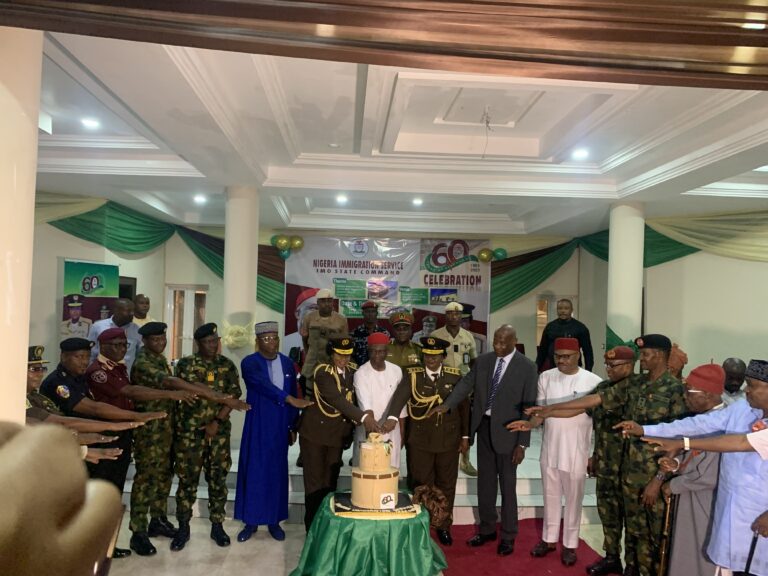
Gov. Hope Uzodinma of Imo has urged the Nigeria Immigration Service (NIS) to commit to strict migration guidelines for intending entrants to the country.
Uzodinma made the call on the occasion of the 60th anniversary ceremony of the NIS organised by its Imo Command, in Owerri, on Tuesday.
The governor who was represented by the Deputy Governor, Prof. Placid Njoku, urged the service to be more proactive about issues of illegal migration with a view to preventing movement of unauthorized immigrants.
According to him, illegal migration, if left unchecked, could leave the country welcoming individuals whose motives for entering the country could be dangerous, thus contributing to insecurity.
“A lot of people who enter Nigeria through porous borders have no good intentions for the country and pose serious security threat.
“ You must therefore redouble your efforts in the area of border patrol and an insistence on strict immigration guidelines “, he said.
Delivering a lecturer, Chief Joachim Olumba, a retired Comptroller of Immigration, listed duties performed by the Service to include the attraction of foreign direct investments through the administration of the Nigerian Visa Policy as well as air border control among others.
He spoke on the theme: “ Migration Management in Nigeria, Its Essence and Implication
,for National Growth and Development “.
He congratulated the NIS on another successful anniversary adding that it has been a story of many breakthroughs despite challenges.
Earlier in an address, the command’s Comptroller, Mrs Nkechi Ezugwu, thanked the governor for providing the enabling environment for the activities of the Service in Imo and promised to work collaterally with relevant stakeholders in line with the mandate of the Service.
Also speaking, the Assistant Comptroller-General in charge of Zone “E”, Mrs Angela Okoye, commended men and officers of the Command for their patriotic sacrifices and assured them that the management of the Service will continue to restructure for improved services and welfare of officers.
A former Minister of Interior, Capt. Emmanuel Iheanacho, urged the NIS to continue to build on their successes with a renewed commitment to national security.
The event was attended by all Heads of military and paramilitary outfits in Imo as well as religious leaders and traditional rulers.
Aug. 1, 1963, Immigration Department came of age when it was formally established by an Act of Parliament, Cap I71, Laws of the Federation Nigeria.
The head of the department became known as the Director of Immigration.
The Immigration Department, as it was known then, was entrusted with the core immigration duties under the headship of the Chief Federal Immigration Officer (CFIO) and the first to sit on that chair was Mr E.H. Harrison.
The department in its emergent stages inherited the Immigration Ordinance of 1958 for its operation.
Following some structural reforms and Government white paper on Oct. 1, 1992, the designation of “Director of Immigration” was changed to “Comptroller General of Immigration Service”, thereby granting the Service a para-military status.
Thus the last Director of Immigration became the first Comptroller General of Immigration (CGI) in the person of CGI Garba Abbas.
Subsequently, the Service has come a long way in its march towards reformation and restructuring to be better positioned for the implementation of modern migration management.
This period saw changes in the organizational and operational structure of the Service and which were inevitable towards accommodating the added responsibilities as well as emerging regional and sub-regional political alignments.
These included the introduction of the ECOWAS and African Affairs division, Aliens Control and Border Patrol Management and such other added responsibilities for the Service.
Furthermore, in 1988, the Service was saddled with the responsibility for the issuance of all Nigerian travel documents which included the Nigeria Passports.
Headline
Prince Harry visits sick Nigerian soldiers in Kaduna

Prince Harry and his team visited the 44 Nigerian Army Reference Hospital in Kaduna to interact with wounded soldiers who are receiving treatment.
The Duke of Sussex is in Nigeria with his wife to champion the Invictus Games, which Harry founded to aid the rehabilitation of wounded and sick servicemembers and veterans.
Nigeria joined the Invictus Community of Nations in 2022 becoming the first African country to join.
Prince Harry’s visit to Kaduna came 68 years after his late grandmother Queen Elizabeth II visited the state during the time of the late Premier of Northern Region Sir Ahmadu Bello.




News
Senate approves death penalty for drug traffickers
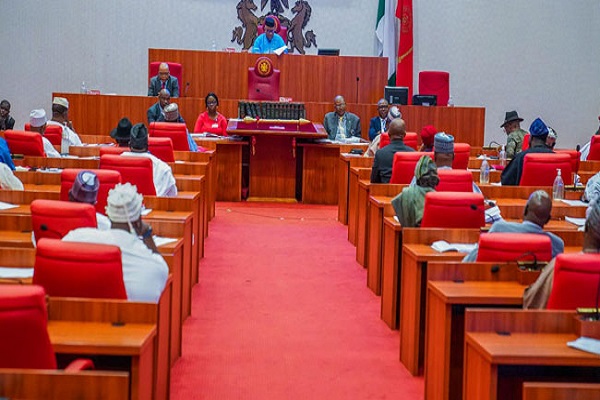
Senate on Thursday, May 9, approved the death penalty for those convicted on the charge of drug trafficking in the country.
The punishment prescribed in the extant NDLEA Act is a maximum sentence of life imprisonment.
The resolution of the Senate followed its consideration of a report of the Committees on Judiciary, Human Rights and Legal Matters and Drugs and Narcotics, National Drug Law Enforcement Agency (NDLEA) Act (Amendment) Bill, 2024.
The Chairman of the Committee on Judiciary, Human Rights & Legal Matters presented the report during plenary, Senator Mohammed Monguno (APC-Borno North).
The bill, which passed its third reading, aims to update the list of dangerous drugs, strengthen the operations of the NDLEA, review penalties, and empower the establishment of laboratories.
Section 11 of the current act prescribes that “any person who, without lawful authority; imports, manufactures, produces, processes, plants or grows the drugs popularly known as cocaine, LSD, heroin or any other similar drugs shall be guilty of an offence and liable on conviction to be sentenced to imprisonment for life” was amended to reflect a stiffer penalty of death.
Although the report did not recommend a death penalty for the offence, during consideration, Senator Ali Ndume moved that the life sentence should be upgraded to the death penalty.
During a clause-by-clause consideration of the Bill, Deputy Senate President Barau Jibrin, who presided over the session, put the amendment on the death penalty to a voice vote and ruled that the “ayes” had it.
But Senator Adams Oshiomhole objected to the ruling, saying that the “nays” had it.
He argued that matters of life and death should not be treated hurriedly, but Barau said it was too late, as he failed to call for division immediately after his ruling.
The bill was subsequently read for the third time and passed by the Senate.
-

 Headline5 days ago
Headline5 days agoPrince Harry visits sick Nigerian soldiers in Kaduna
-

 Entertainment5 days ago
Entertainment5 days agoAMVCA Cultural Day: BBNaija’s Neo, Venita win Best Dressed Male, Female
-

 Metro5 days ago
Metro5 days agoEx-Sports Minister laments after hospital neglected him for hours over N80000 deposit
-

 Headline5 days ago
Headline5 days agoEFCC bars dollar transactions, orders embassies to charge in naira

